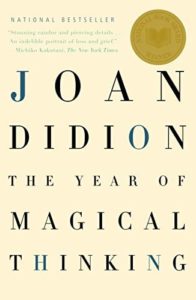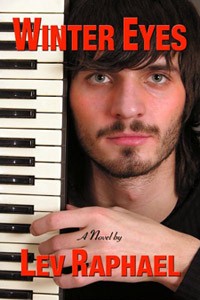Though I deeply admired Joan Didion’s essays and fiction and had read Play it as it Lays many times, I avoided her acclaimed memoir when it came out in 2005. The book dealt with the death of her husband of forty years and because I was still reeling from the death of my mother, I didn’t feel I was ready. Even a National Book Award didn’t change my mind.
Perversely, perhaps, I’m ready now when my 102-year-old father is in a slow decline and his hospice nurse is very pessimistic about his chances for pulling out of it. He’s like an abandoned ship without crew or captain, barely recognizable as the man he used to be even into his 90’s.
Seeking catharsis or comfort or something in between, I picked up Didion’s memoir last weekend. It’s a stunning, visceral travelogue into a world anyone of us can enter at a moment: the land of illness, the land of sudden death.
Didion’s novelist husband John Gregory Dunne died after a massive heart attack at dinner one night in New York, at home, and this was soon after they had been visiting their deathly ill daughter at the hospital. She was in an induced coma and there was every possibility she could die.
Years earlier, Didion had written about this terrible kind of unexpected disaster in Play it as it Lays: “In the whole world, there was not as much sedation as there was instantaneous peril.”
The book is a meticulous mapping of what happened before and after her husband’s death and her daughter’s hospitalizations as Didion examines the events from various standpoints. Her encounters with medical personal are sometimes discouraging, sometimes bizarre, and when it comes to her daughter’s repeated hospital stays, she had to learn how to ask questions without seeming like a nag or a smart ass. Those times force her to learn about procedures and medications as if she were taking a crash course in a foreign language.
Didion and her husband were deeply connected to each other through their work, never rivals, always collaborators. Their privileged life of writing screenplays in Hawaii, trips abroad, publicity tours, mingling with other celebrities, and eating at famous restaurants was no protection from cataclysmic change. Et in Arcadia ego is ascribed to Virgil: Death is in Arcadia too.
Didion seeks answers or solace or stability through reading sublime poetry and matter-of-fact depictions of illness and death like Sherwin Nuland’s How We Die. And she explores all the ways in which friends tried to help her and assuage her grief. Most mesmerizing is the clear-eyed recounting of how she could not cope with her husband’s death and even denied that it had happened. This kind of trauma is approached as a medical/psychological issue and as a sort of mystery: What was she thinking? How was she thinking–and why?
Didion is like someone who’s just barely survived an earthquake that destroyed her home and is picking through the rubble to see what might not have been lost. The book is harrowing, beautifully written and observed, an unforgettable exploration of grief and loss.
Lev Raphael is the author of the memoir My Germany and twenty-six other books in many genres. His work has been translated into fifteen languages and he currently mentors, coaches, and edits writers at writewithoutborders.com.


